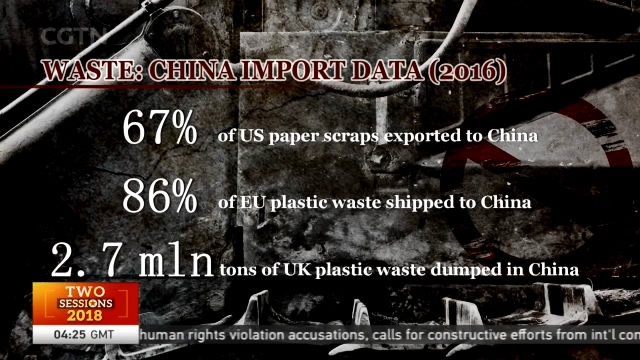
13:10, 14-Mar-2018
China's Ban on Solid Waste Imports: Ban prompts global recycling awareness

2018 has already seen a big step forward for China environmentally. A ban on solid waste imports went into effect on January 1st. This could lead to China no longer being the top destination for recyclable trash. The ban has left other countries scrambling to find a new dumping ground.
A positive change in China's environment. The country's ban on waste imports officially took effect as the New Year kicked off, just six months after the move was announced in July. Covering 24 categories of solid waste, the ban includes certain types of plastics, paper, and textiles. Guangzhou customs are going the extra mile, carrying out stricter rules.
QIU LIANG GUANGZHOU CUSTOMS "We follow the 'three 100 percent' rule. We weigh 100 percent of containers, scan 100 percent of them through the X-ray like portal, then if we find something abnormal, we manually inspect 100 percent of the cargo."
Ripple effects of this ban have spread across the world. The Royal Queen has declared a "war on plastic", forbidding all non-biodegradable plastic products in Buckingham Palace. For regular folks in London these days, a cup of Starbucks may cost an extra 25 pennies in so-called "latte tax".
According to a survey in the UK, every year an average 2.5 billion coffee cups are thrown out -- the total length could circle the earth 5.5 times. This has led to a determination to eliminate all avoidable plastic waste by 2042. And in the EU, analysts believe that without China, there will be difficulties dealing with waste in the short term. This has prompted Brussels to tighten its already strict standards, demanding that all plastic packaging be reusable or recyclable by 2030.
The US is even using artificial intelligence to sort out recyclables not included in the ban to meet China's import standard. And according to a local expert on scrap paper exports, Japan is now eying Southeast Asia as a new spot to dump waste.
In the past 20 years, China's yearly imports of plastic waste have increased 10-fold and reached 45 million tons. In 2016 alone, two-thirds of the US' paper scraps were exported to China, 86% of the EU's recyclable plastics shipped to China, and 2.7 million tons of the UK's plastic waste dumped in the Asian nation.
Through banning imports of waste, air pollution levels in China are set to improve, as less waste will be burned. This will also free up workers at unlicensed recycling sites, who risk their lives in the sorting process. Some believe this could be a chance for heavy exporters to push forward a "green revolution" and build their own recycle chain.

SITEMAP
Copyright © 2018 CGTN. Beijing ICP prepared NO.16065310-3
Copyright © 2018 CGTN. Beijing ICP prepared NO.16065310-3